1989 Monaco Grand Prix race report
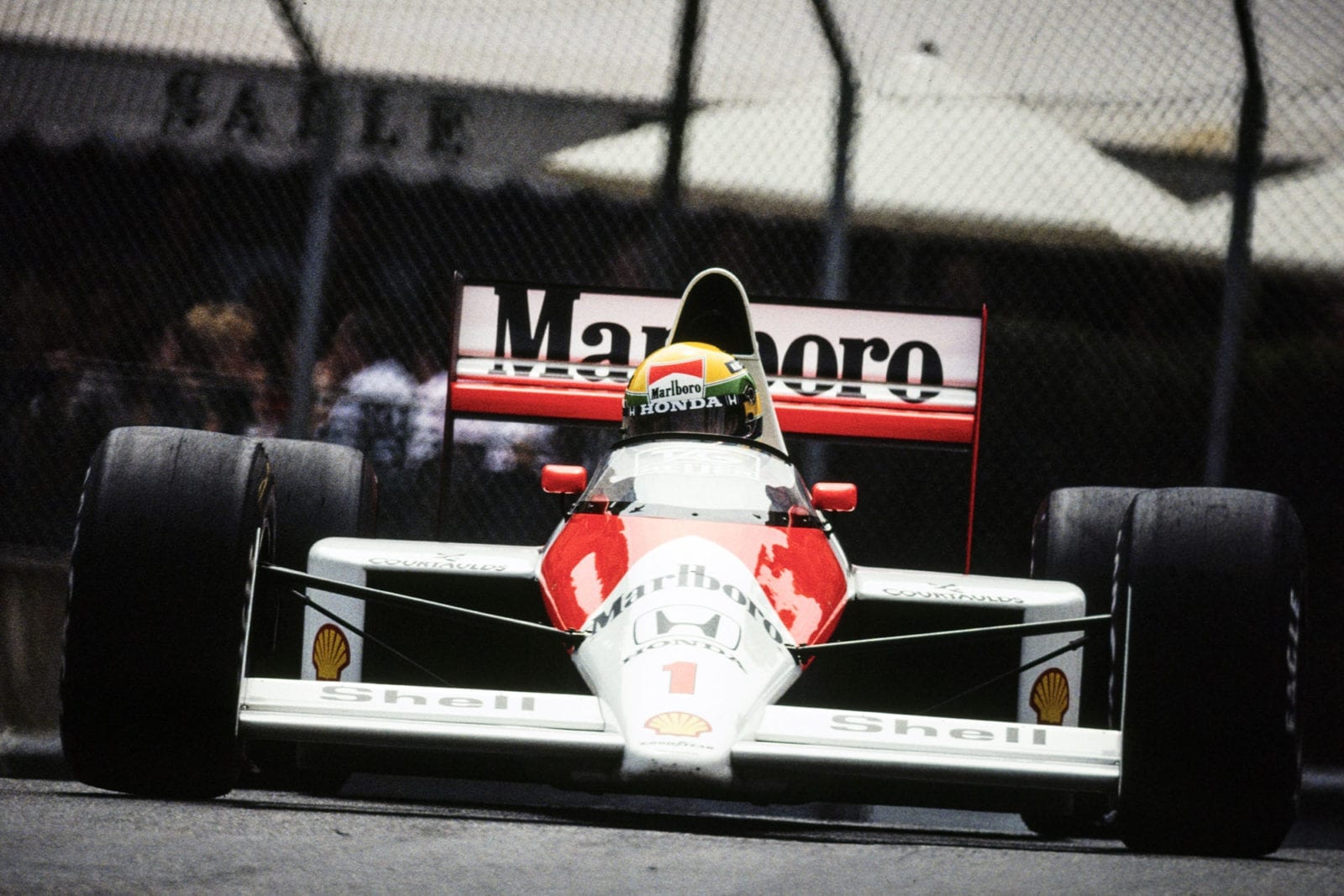
McLaren's Ayrton Senna put in another peerless Monaco performance
Motorsport Images
Sweet sixteen for Senna
The bald facts say that Ayrton Senna pulverised his opposition to win his 16th Grand Prix in Monaco. That he won going away in a crisp style which exorcised the ghost of 1988, when he had led comfortably only to slide into the barrier at Portier following a momentary lapse of concentration.
As usual, however, the bald facts tell only part of the story.
The one that unravelled in the cramped streets of the Principality had its preface in the first lap of the restarted San Marino Grand Prix. There, against an agreement he had made beforehand with Alain Prost, Senna took the lead from the Frenchman at the entry to Tosa on the third corner. They had agreed not to do that to each other in the opening laps, to avoid unnecessary risk. That was why Prost was so angry after the race, why he stormed away with barely a word to anyone. Why, at Pembrey during testing the following week, he had listened as, at Ron Dennis’ insistence, Senna apologised to him.
According to Dennis in Monaco, that was the end of the matter. Honda Marlboro McLaren is a team full of knockabout humour — Ron told us so. “At McLaren we like to have fun and enjoy our racing,” he said with a straight face, as Pressmen covered their mouths and politely tried not to laugh outright.
The trouble was, it was far from the end of the matter. The next day Prost was interviewed by L’Equipe and came out with some juicy titbits. “I now know what Senna is,” he began. “I should have known last year, but I won’t make the same mistake again. McLaren has always been loyal to me and, as far as technical discussions go, I will not completely close the door. As far as Senna is concerned, I want nothing more to do with him. I have always tried to keep good relationships in the team, but I will no longer do that with Senna.
“What I appreciate more than anything else is honesty. He has not been honest. Ron Dennis had to put him under a lot of pressure to tell the truth.”
In French racing circles last year The Professor became known as The Terrorist on account of his guerilla warfare tactics against Senna, and many saw the L’Equipe piece as a similar ploy, particularly as he continued: “Ayrton was very upset. He even cried.” Telling pause. “It was incredible!” As in Imola, Senna maintained silence, privately commenting that if Prost didn’t like the way he raced, he could always try catching him.
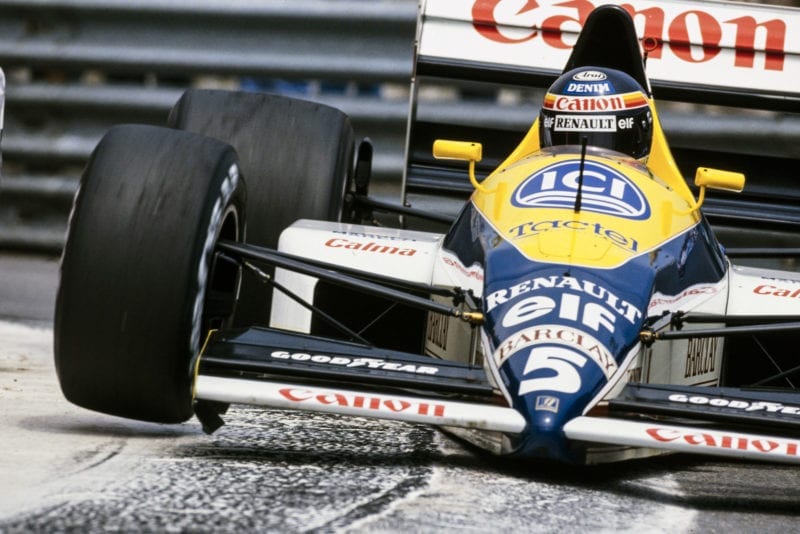
Thierry Boutsen was the closest challenger to the McLaren’s with 3rd for Williams in qualifying
Motorsport Images
And try Prost did. It surely doesn’t need to be said that the red-and-white cars from Woking were in a class of their own in Monaco, and for much of qualifying they were separated on the watches by mere tenths. Prost dominated the untimed sessions, but it was Senna ahead when it mattered. Partway through Saturday’s final session they were still inseparable, lapping in the 1min 23sec bracket, when the Brazilian found that elusive clear lap and slammed in a 1min 22.308sec. We are used to breathtaking performances from Ayrton, but this was something else.
On the opening lap he went round two seconds faster than Prost — 1min 34.215sec to 1min 36.167sec — but by the fourth the two McLarens were nose to tail, Prost feinting and weaving to unsettle him. It made the rest look silly, until you realised that Senna was dictating the pace and that Thierry Boutsen, Nigel Mansell and Martin Brundle were closing up. When five leaders are bunched in a place as unpredictable as Monaco, anything can happen. Maybe, just maybe …
The race had already lost Derek Warwick, Pierluigi Martini and Olivier Grouillard by that stage. Bursting with confidence on a circuit he loves, the Englishman had been in stunning form in the Arrows throughout qualifying, revelling in its balance to line up sixth. A dragging clutch caused him to stall just as the red lights came on for the first scheduled start, and the delay obliged the starter to call a five-minute halt. On the new opening lap there was Derek, apparently comfortable in sixth despite menace from a charging Andrea de Cesaris. His challenge, however, lasted only one more lap. Going down to Mirabeau on the third his cockpit began to fill with smoke from an electrical short behind the dashboard, and he parked just past Portier, bitterly disappointed.
Martini, once the joke of Formula One but now a serious pedaller in the continuously improving Minardi, had qualified eleventh just as he did in Imola. And just as in Imola he was an early retirement with a transmission problem. A broken clutch dropped him from a fighting eighth on lap four.
Grouillard, for the third time this season well ahead of Ligier team-mate Rene Arnoux, had been tenth fastest on the first day of qualifying, and eventually lined up 16th. He was 14th when the transmission began to seize, and like Warwick and Martini would have been a points candidate had he kept going.
The race, such as it was, had begun to fall apart when Senna got a good break lapping Mauricio Gugelmin coming out of the chicane. The March driver had qualified reasonably as he struggled to sort out the new CG891 on its race debut, but when it stuck in gear on the warm-up lap he had been obliged to step into the old 881, which had barely been set up for the streets. Senna got him just into Tabac; Prost had to wait until partway round the swimming pool. It wasn’t Mauricio helping Senna or anything like that; just Monaco luck.
Just as it proved Monaco luck when Senna came across Arnoux past the pits and was able to lap him before Ste Devote. The veteran Frenchman, racing for the first time this year, was in his usual truculent mode, holding up an urgent train comprising impressive debutant Pierre-Henri Raphanel, an uninspired Nelson Piquet, a gripless Johnny Herbert and an understeering Jonathan Palmer. Indeed, so much was Arnoux slowing the pace that Luis Sala eventually tacked on to the group after a slow start in his SCM Minardi.
A look through a year’s reporting would bring forth a stream of criticisms of Arnoux, from all manner of other drivers who have suffered at his hands. In Monaco, he was worse than ever.
First there had been a brush at Loews with Ivan Capelli. That had been sufficient to damage the new CG891’s bodywork and electrics and would, with mere laps to go with the Italian in sixth place, bring him to a halt with a minor electrical bonfire. There would also be vicious chops to de Cesaris and Eddie Cheever as they tried to lap him. The American is not a fan of the Frenchman, especially after Rio. It would have been imprudent to ask his further opinion immediately after the race.
There was a clash with Johnny Herbert, with whom he’d already collided in qualifying, which removed the right front fin from the ill-handling Benetton and sent the Briton scurrying pitward.
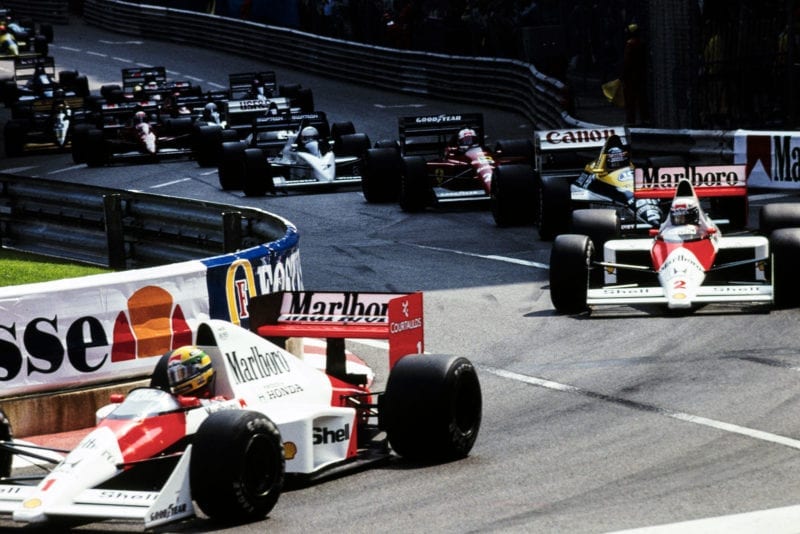
Senna takes out an immediate lead
Motorsport Images
Arnoux’s real pieces de reststance, however, were blatant blocking moves on both Prost and Mansell. Time and again the Ligier wobbled to the middle of the road to keep Prost back, even as they passed the pits. There, Rene deliberately moved on to the racing line to frustrate any passing move. Prost is the first to admit that he lacks Senna’s ruthlessness in traffic, but this was ridiculous. And still the stewards took no black flag action.
Eventually Alain slipped past, but from 8.7 seconds the gap had leaped to 14. “I don’t expect people to move just because I’m there,” he said, “but it is stupid to lose your chance because of such tactics”.
To show just how stupid he is, Arnoux kept Mansell at bay too, the Ferrari driver weaving aggressively in his mirrors as they sped up to Casino Square. By the time the Englishman had found a way by, the two McLarens were gone.
By this time, so had the Canon Williams challenge, which had looked good with Boutsen third on the grid and Patrese seventh despite persistent gearbox and clutch problems. As Senna slowed the early running, Thierry had begun to close on Prost, but then part of his rear wing broke away. “Our fault for racing untested components,” admitted a candid team spokesman. The same thing had happened only laps earlier to Patrese, and both drivers had described the sensation as akin to a puncture in the right rear tyre. From then on they were consigned to catch-up roles, but at least the Renault V10s ran reliably throughout.
Mansell’s occupation of third didn’t last long. In untimed practice the brave Briton had experienced an alarming rear suspension failure in Casino Square, followed by a front wing breakage in the same place. One of the great corners in Grand Prix racing, it is not one you would choose for such problems. Both times Mansell managed to keep the F1/89 off the guardrails, but even he wasn’t sure how afterwards. Now, in the race, it was his gearbox which was providing the drama. Lap by lap he became less sure of finding the gears he wanted, and Brundle, in his wheel-tracks, surged ahead on lap 18.
It was hard to believe Brundle had barely scraped through pre-qualifying, problems with a misfire on his race Brabharn obliging him to use the spare. Mercifully he did get through, and once he’d shaken off the effects of a head cold by Saturday, he looked dynamite as he planted the BT58 firmly in fourth slot on the grid. His performance in hounding Mansell, and then reeling in Prost, was a sensational reminder that this was the man who used to beat Senna in equal equipment back in their Formula Three days …
His chase of Prost, however, had been helped by an extraordinary incident enacted between Piquet and de Cesaris on lap 33.
Two years ago Senna won the Monaco GP for Lotus in the 100T. Ever since it has been downhill for both Lotus and Camel, and Monaco highlighted the urgent need for both parties to reassess the “value” of the thrice World Champion to its current racing and marketing programmes. Nakajima failed to qualify, as one might expect of a journeyman hired because of the money he brought from PIAA and Epson, but one had every right to expect more commitment from the man paid several million dollars a year to promote the Camel brand on the world circuits.
He looked for all the world like a typical tourist seeking a parking place; and he was actually being lapped by de Cesaris, at Loews, when he turned the Lotus in, caught the side of the Dallara, and found one. The two became locked in an obscene mechanical embrace that took the marshals several minutes to disentangle. During those minutes, Prost was one of those delayed. The previous lap he had circulated in 1min 28.731 sec. That lap took him 1 min 51.863 sec. Twenty one seconds lost as he braked to a halt — “Amazing. I’ve never had to do that before in my entire career!” — and then found that his gearbox wouldn’t initially select a gear.
“I almost laughed in the car, it was a such a joke. But this is Monaco!
The delay was to have a crucial effect. Although Senna was already way up the road, all was not well with his MP4/5. First gear had begun to jump out occasionally, as it had in qualifying. Then second stripped under the strain of negotiating the hairpins. “I could get by without first, but no second was a big problem. I had to adapt my style so Alain wouldn’t get a clue I was in trouble.” He shaved barriers, slid through the tighter corners in a heart-warming display. It was enough to stabilise the gap, and Prost was led to believe there was no point in risking an out-and-out challenge. That was when Senna really won his second Monaco.
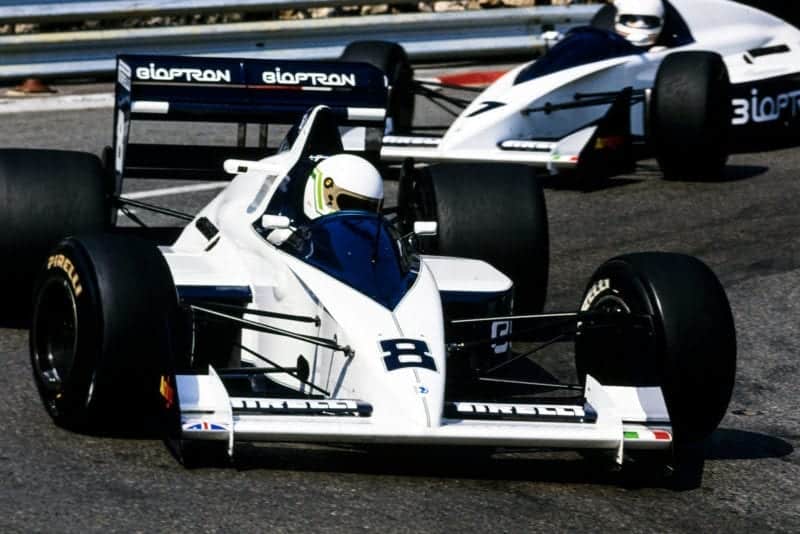
Brabham’s Stefano Modena scored an impressive 3rd for Brabham
Motorsport Images
De Cesaris sped on, out of contention now but driving as well as he occasionally can. Had he scored points, they would have been deserved. Instead, Scuderia Italia honour was left in the hands of Alex Caffi. Two years ago he had revealed his raw ability with the Osella in Monte Carlo. Now he sat for 44 laps pressuring the equally impressive Gabriele Tarquini in the AGS as they underlined the strength of the new generation of Italians.
When Tarquini’s engine finally cried enough, and the AGS’ great run was over, Caffi swept on to fourth, for his and Dallara’s first-ever points. But for the battle with Tarquini, he might have been able to offer more of a challenge to Stefano Modena, whose excellent fourth became third when Brundle spluttered pitward to have a flat battery replaced on lap 48. Martin couldn’t believe his ill-fortune, but boiled back into the fray tenth and just snatched sixth from Cheever and Capelli in the closing laps. A point was at least some reward for his best Formula One showing.
While Brundle used a new set of Pirellis to set second fastest lap, Modena underlined the progress made by the Italian tyre company since Rio by going the distance with his rubber in perfect shape, and netting ninth fastest lap. He’d run problem-free, and a rostrum slot isn’t a bad way to open your World Championship points tally.
Michele Alboreto made it a good day for Italy — with a fifth place nobody expected when it was learned he was still in Milan during Thursday qualifying! He had refused to drive a Tyrrell 017B that day, since he was so uncomfortable in one in Brazil, but when his new 018 arrived for Saturday he celebrated by planting it twelfth on the grid. He raced it well, too, despite inherent understeer, and such was the manner in which Arnoux was baulking his group that Michele lapped team-mate Jonathan Palmer by lap 50. By then the Tyrrell was under little threat from Sandro Nannini, since the Benetton had begun to run short of brakes, but once both 018s had passed Arnoux, Palmer felt he was being held up. He’d let Michele by earlier and was angered when the compliment wasn’t returned, but once he had unlapped himself on his team-mate he cut his lap times by three seconds and pulled away to hound Nannini, with Boutsen dogging his every move. By the flag a mere second separated all three.
Raphanel, the 1985 winner of the Formula Three race, ended his plucky performance in the DFR-engined Coloni with gearbox failure on lap 20, while team-mate Roberto Moreno struggled with awful handling in his less powerful DFZ version and quit 25 laps later with a similar complaint. He was joined shortly after by Sala, with whom he had diced, when the Minardi’s engine blew. Ninth fastest time on Friday suggested the newly-designated Equipe Larrousse might enjoy an upturn in fortune in Monaco, the second race for the LC89 (should that now be L89?), but rear-wheel drive-peg problems prevented Yannick Dalmas from qualifying, and changes to enhance Alliot’s car made it worse instead. Nevertheless, he was pounding along a strong ninth, chasing Alboreto and Nannini and fending off Cheever and Capelli, when the engine lost its edge at the chicane on lap 39.
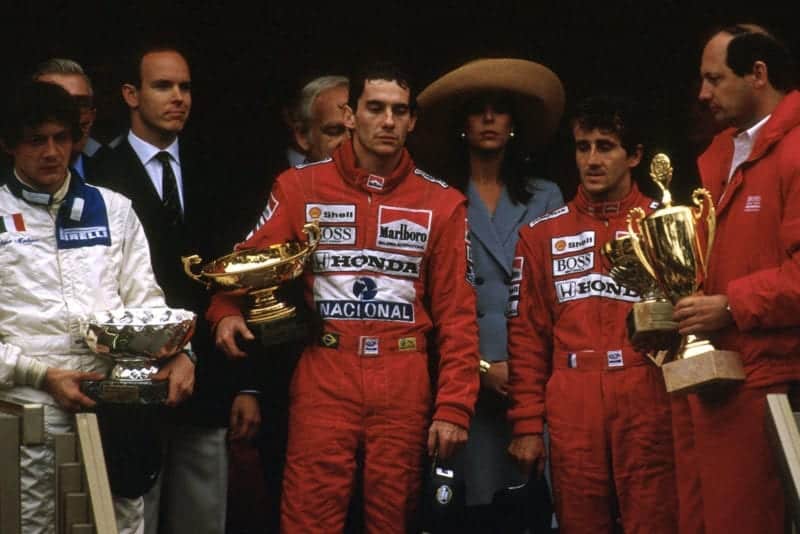
Senna takes the plaudits
Motorsport Images
Now that the simmering acrimony between Senna and Prost was firmly out in the open, their battle took on an extra edge. There have been diplomatic incidents in the past — witness Estoril last year — but now it is clear neither will be accompanying the other to the ballgame. In such circumstances, Senna could take extra pleasure in such a glittering success. It was indeed Sweet Sixteen. DJT
